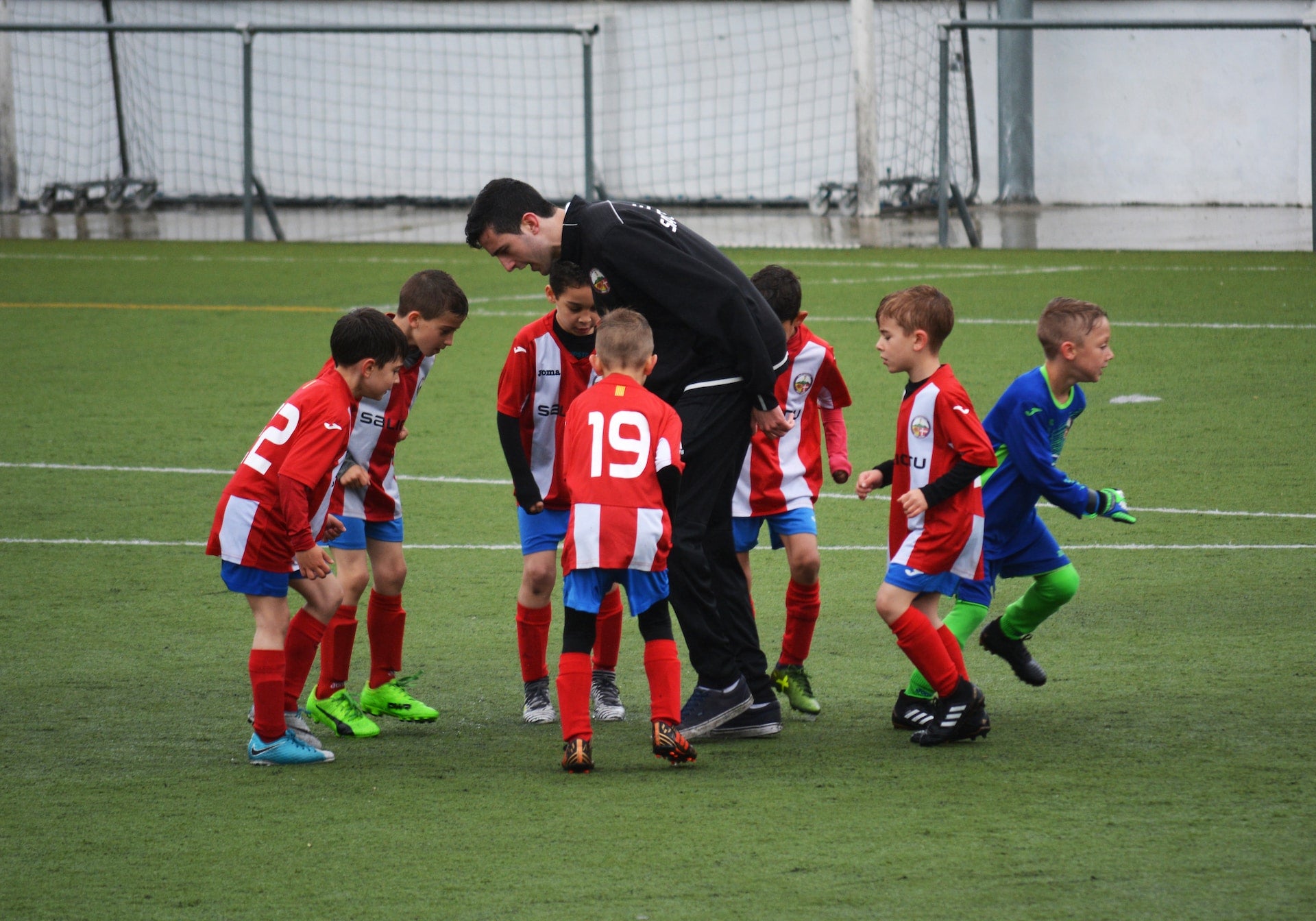If you've spent any time at youth sports practices and games, you'll have probably seen the mom berating the refs from the stands or the dad yelling at the coach after the game about his kid's lack of playing time. Then there are those kids who cower while their parents lambast their performances until they get sick of it and quit. If that sounds all too familiar, you might have even become one of these overbearing sports parents. But you don't have to be. Here are some techniques from coaches and youth development experts that can help you put the fun back into your children's activities, improve your parenting, and create fond family memories for years to come.
- Pursue Character, Not Better Stats
As kids progress in youth sports, they should be having just as much fun as when they first fell in love with basketball, soccer, or whatever activity they’re doing. But sometimes adults – and parents are as much to blame as anyone – put out this fire by making it all about accolades, winning records, and scoring averages. By the time they’re in middle school, it can become second nature for kids to tie their entire self-worth to such objective outcomes, to the point that they begin to dread practices and games and long for a way out. The arms race merely heats up as they get closer to college, with recruiting services assigning individual rankings and grouping players by star ratings. No wonder 65 percent of 3,000 Wisconsin high schoolers surveyed showed signs of anxiety and 68 percent were depressed.
Many of these issues have their roots in the unrealistic pressures parents put on their kids, and their misguided emphasis on team results and individual stats. In his insightful book The Game is Hard Enough, author Steve Lloyd shares the inscription on Henry “Hank” Aaron’s tombstone: “I am not concerned about how I am perceived as a baseball player. I am concerned about how I am thought of as a human being.” This philosophy informed how Lloyd approached the development of his own son, Matt, who is now a member of the Cincinnati Reds organization:
Knowing that someday it (playing baseball) would end compelled us to try and help our son maximize every possibility he could, to become everything he could be in every aspect of his life, and to help him grow in his love for the game. It was always, and still is, our hope that Matt pursues the game, to follow his dream for as long as he possibly could, and that baseball could be a means to a greater end for him. Even today (with Matt pursuing his career as a professional ball player), it still is. That end is for him to continue to become the best version of his best self.
- Say This, Not That
A generation of Disney sports movies has convinced us that to get young athletes motivated, they need an epic, Braveheart-style rallying cry before kickoff and an epic halftime speech in the locker room that turns the team’s fortunes around. Many parents have added in constantly hollering advice from the sideline and an exhaustive, play-by-play breakdown in the car ride home. Such behavior is likely well-intentioned most of the time, but when there are too many words being fired at them constantly young athletes might feel confused about their parents’ expectations for them before a game, distracted or embarrassed during it, and overly criticized after the final whistle blows.
In a blog post, student development expert Tim Elmore shared some ways that parents can simplify how they communicate with their kids either side of practices and games. He recommended saying, “Have fun,” “Play hard,” or “I love you” beforehand, and then, “Did you have fun?” “I’m proud of you,” or “I love you” afterward. Elmore went on to reference the extensive research that Bruce E. Brown and Rob Miller have done on parent-athlete communication, which concluded that the thing college athletes wanted their mom or dad to say most was, “I love to watch you play.” During the contest itself, it might be best to supplement this simple affirmation by cheering for your child and their teammates while cutting out criticism of them, the coach, or the referees.
It might be that your son or daughter sometimes needs more from you than simple phrases. Perhaps they’re nervous about a playoff game or state track meet, or, if they’re the analytical type, want to break down each phase of a match after it’s finished. There’s no harm in this, but make sure it’s them who initiates the conversation. You could also get proactive and ask them what’s helpful to hear and not on the way to and from sporting events. Then try your best to do as they’d asked and be a supporter first, rather than an armchair critic.
- Cut Out Conflict with Coaches
No parent should ever let a coach get away with verbally abusing or bullying their child. But sadly, there are an increasing number of moms and dads who make their kids’ coaches the enemy for no good reason. Whether it’s complaints about playing time, putting little Johnny or Jane outside of their preferred position, or trying to remove consequences when a coach is just trying to keep a kid accountable, helicopter parents have evolved into steamrollers who flatten any leader who doesn’t live up to their impossible expectations. Individual grudges can progress into a cabal of parents clubbing together to force the current coach out, even though they’re just as likely to be dissatisfied with his or her replacement.
The Positive Coaching Alliance offers a bevy of free resources to help coaches, parents, athletes, and administrators come together in making youth sports more caring, collaborative, and nurturing. In their tips for first-time sports parents, they include this helpful advice for how to support coaches instead of undermining them. Taking it to heart will not only improve your own parent-coach relationship, but also model respectful behavior that your children and other parents are likely to imitate if you take the lead:
Coaches put a lot of time into planning practices and ensuring a successful season, so be sure to acknowledge their efforts often! Encourage your child to thank the coach after each game or practice. Offer to help the coaches however you can. That may mean anything from occasionally helping out at practice to creating the snack schedule or coordinating carpools. Coaches need parents’ support, and your children may appreciate seeing how enthusiastically you support their team.
- Stop Chasing Status
One of the most destructive elements of families keeping up with the Joneses comes to the forefront when parents use their kids’ sporting status as a badge of courage. Whether it’s trying to make up for their own unfulfilled potential or missed opportunities, taking what was originally just a desire to see their children succeed to a bad place, or having something to brag about to their friends, parents can push too hard, too fast, for too long. In a TED Talk titled Give Sport Back to the Kids, youth development expert Matt Young highlights this as one of the ways in which adults force seven out of every 10 kids who play sports out of the game by the time they turn 13. He went on to explain how the phony “elite” label – which he said should only be applied to the LeBron James and Serena Williams-level adult athletes – isn’t helping kids, but rather hindering them:
Many parents think that kids’ performance is a reflection on themselves and that placement on the house team will adversely affect their social status. So they pay extra for coaching, personal trainers, hoodies, ball caps, and backpacks, all smoke and mirrors confirmation of elite status. And with that increase in investment comes an increase in expectation, usually in the form of parents saying, “I'm paying all this money and that's how you show up?” Because being a member of the elite team demands a serious commitment, an extra hour of practice every evening, four to five hours on the weekend, and no less than five showcases formally called tournaments preseason. And don't even think about playing another sport or having another hobby because there's no time for that.
The antidote to this poisonous pursuit of status is to stop looking for the program with the highest price, the fanciest facilities, and the heaviest travel schedule. If your child isn’t being challenged enough in their current team, wait until the end of the season and then work with them to find quality coaches with a proven track record who are just as committed to developing winners in life as they are in competition. They’re the ones who can truly advance your son’s or daughter’s development, even if they are not running your city’s flagship program.





















